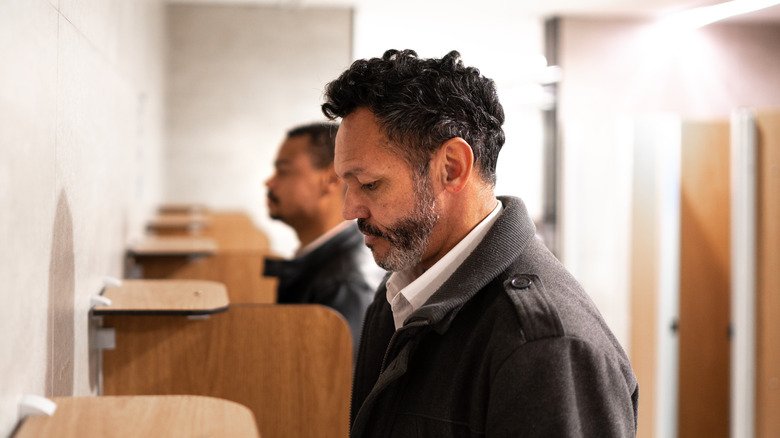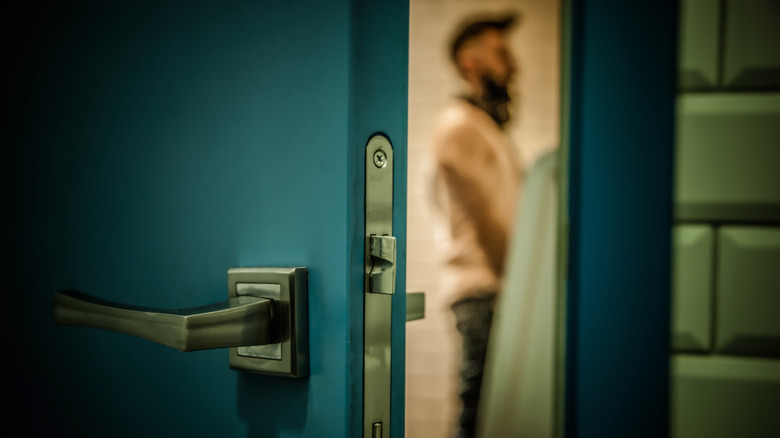We Finally Know Why Men Shiver While Peeing
Shivering while peeing is not something cute and amusing that only happens to babies. It happens to adults too, more specifically, men (although science isn't entirely sure if women don't experience pee shivers).
Men, you know what we're talking about. You go into the bathroom with a full bladder, not being able to hold in your pee any longer, eager to relieve yourself, and feel shivers up and down your spine as you do. It can feel alarming or even pleasant to some. According to Dr. Anish Sheth, a gastroenterologist and assistant professor of medicine at Yale University and co-author of "What's My Pee Telling Me?", the pee chills are reserved for large amounts of urine and not tiny tinkles, so to speak (via NBC News).
Interestingly, this phenomenon actually has a name (albeit unrecognized by science and in need of further research): post-micturition convulsion syndrome. There are two theories behind why this happens. The first one is pretty straightforward: men are exposing their private parts to the apparently cold environment outside their clothing while peeing. At the same time, they're also peeing out warm urine. The idea is that this creates an internal imbalance in temperatures, which results in the shudders. It could also simply mean that the shiver is an involuntary attempt by your body to warm itself again. But not all scientists are convinced about this. Probably, the most talked-about pee shiver theory is the one related to your automatic nervous system.
Shivering while peeing: How it might be connected to your automatic nervous system
Your automatic nervous system (ANS) controls the act of peeing, even though the decision to pee itself is voluntary. The ANS also orchestrates things like temperature, digestion, and your heartbeat. When it comes to peeing, your parasympathetic nervous system (PNS) and the sympathetic nervous system (SNS), which are part of the ANS, are what come into play.
When your bladder is full, this stretching sensation is detected by receptors in the muscular wall of the bladder. This sets off a reaction (the activation of the sacral nerves in your spinal cord), which results in your PNS being alerted to contract the bladder wall in preparation to push the urine outside of your body. As you expel the urine, your blood pressure drops. "There does seem to be good evidence that blood pressure rises slightly with a full bladder, and that this drops on voiding, or soon after," explained Dr. Simon Fulford, consultant urologist at the James Cook University Hospital in the United Kingdom (via Live Science).
This drop in blood pressure seems to trigger your SNS, which is involved in your stress response of fight or flight. Your SNS, in an attempt to combat the drop in blood pressure, releases something called catecholamines, neurotransmitters that perform many functions, including restoring blood pressure levels. Science seems to think this sudden release of catecholamines (triggered by your SNS) along with the release of urine (triggered by your PNS) are what cause the shivers — a mixed signal of sorts that ends up in involuntary shudders.
Why is it more prevalent in men and is it cause for concern?
Pee shivers may be more prevalent in men because men pee while standing up, meaning they might experience a more significant drop in blood pressure. Speaking about standing up to pee, did you know that sitting down to pee can be beneficial for men? Perhaps we can add a lack of shivers (if you don't enjoy them) to the list of reasons why you should sit down and tinkle. Shuddering while peeing isn't a cause for concern, though. You don't have to worry about the mixed signals between the two different nervous systems or the involuntary shivers. It's all very natural.
However, there are pee symptoms men really shouldn't ignore. Involuntary shivers are one thing, but feeling faint, dizzy, or pain during urination is something else. Micturition syncope, for example, which is fainting while urinating or soon after, is one possible cause for worry. Although not very common, it could occur in older men, according to neurologist Dr. Phillip A. Low (per Mayo Clinic). "The exact cause of micturition syncope isn't fully understood. But it may be related to a fall in blood pressure when you get up suddenly and stand at the toilet [or] when a full bladder empties very quickly." Painful urination can be any number of things, like urinary tract infections (UTI), prostate-related issues, and even cancer. See your healthcare provider if any of these happen.



